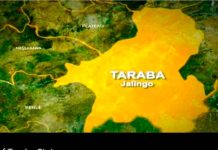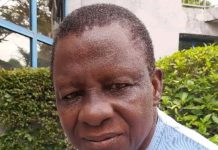By Romeon Ropel
It was almost a four-hour journey, from my take-off point Biu through Gombi to Hong and Askira Uba. To me it was another adventure, navigating through the scenic natural landscape of Borno State, bestriding the Northeast sub region of Nigeria. From the Hauwel in Borno state, the cascading mountains in Gombi to the rocky valley of Hong and Uba in Adamawa state, it was a sight to behold.
We stopped at Uba to fuel our vehicle; Uba town is a thirty-five-minute drive from Mubi town, the town that housed the Adamawa State University and a famous border town with Nigeria and Cameroon. Uba also happen to be among the few local Government areas in the country that uses a single road lane as a demarcating between two state, in this case, a boundary between Borno and Adamawa state.
As we head to Askira Uba the Headquarters of Uba LG being the last major town before Chibok, the signs, effects and devastation of insurgency started manifesting. Every ten kilometer drive was a check point. At most of these check points, passengers must come out from their vehicles, trek about five hundred meters to catch up with their drivers on the other side. There was visible impact of the of insurgency on Askira Uba. many buildings were razed down, amidst heavy military presence.
As we proceeded, my co-traveler, who was not comfortable in discussing the situation, despite my promptings, pointed at an old structure, saying: ‘this is the old local government headquarter which the insurgents were using as their base” This broke the wall of silence that existed between us. “When it became visible that the advancing Nigerian Army will overwhelm them, the insurgents bombed down the edifice and ran away.” He further explained.
It is not certain, whether normalcy had return to Askira Uba, a town that was once under the siege of Boko Haram. There are fears that they might stage a comeback anytime that Soldiers dare to leave the communities. Although in transit, it was not difficult to discern that people are still in fear. Houses occupied by returnees are only by the road side. When I stretched my look beyond the cluster houses by the roadside, I saw a lot of empty houses which probable tell that the people are yet to return. I had a feeling that many may not be willing to come back to their homes again.
Gradually we headed toward Chibok town. At first, I was amazed with the flat table landscape. I thought the town is all flat without rocks but as we approached its first military checkpoint, I saw a mighty rock which, of course, it was the historic rock which the mythical Chibok King that refused to surrender to the Kanuri conquest disappeared into. Some Chibok historians believed the king disappeared into the Rocky Mountains to avoid being captured by the Kanuri jihadist. After the King’s charms could not sustain him anymore against the superior magical power of the Kanuri, the king flied onto the Rock and was never seen again till date. The history stated.
Chibok is not as huge and as devastating as the media had painted. Perhaps, the adoption of the Chibok school girls has given it the fame. However, they were pockets of burnt houses. As we enter the main town, we were first met by the 128 Army Battalion Brigades, a temporary barrack that was built as a results of the Boko Haram attack. I was told by my co traveler that no phone call was allowed in these areas, as the place still wear the face of war. It was a war zone indeed, as soldiers in their large numbers, were seen patrolling up and down the streets.
Chibok is a small town; it took us some few minutes’ drive to cross over it main town. One striking feature with Chibok town is the absence of government presence, in terms of structures and institutions. Chibok is an example of Government neglect, by both the state and the Federal Government. None of the streets that we passed through were tarred, although the streets were in the centre of the town.
We move towards the famous government Girls Secondary School Chibok where the girls were adopted, the school was situated about ten minutes’ drive away from the main town. From the look of things, the school had undergone some renovation and the place is still guarded by security. I tried to take a photo, but I was flagged down a soldier, who warned me not to dare it.
G.G.S.S Chibok must had been like many others secondary schools left by government without any form of social or security infrastructures due to negligence. The road to the school was washed off by erosion. I was even informed by my co traveler that “the school was not fenced at the time the Boko Haram invaded and adopted the girls. He also told me that, at the time of the invasion, there was no serious security arrangement on ground that can guarantee safety for the students. He even showed me the path that the Boko Haram exited and made their way into Sambisa forest with the girls.
However, Chibok wore an ambience of peace at the time of my visit. I was able to walk some distance down the new school that the girls were transferred to. On my way back, I chatted with some residents and students, who were on their way back to school. They were scared of me at first, but later some were able to talk with me. Most of them said “they will not go back to the school even if the government build soldier barrack around the school. I tried to know if the abducted girls that were released has being at home or back to the school, and I was informed that many of them refused to go back to the government school in Chibok. All my efforts to get information on how I can locate any of the released girls proved abortive. Nobody in town was comfortable with giving me information, a stranger whose interest was hinged on the activities Boko Haram and the released girls.
Nevertheless, Chibok people are hospitable. The Mama-put I ate at her place seem so caring. On my extra plate, in a meal that was very delicious, she offered me free gbomo and free sachet of water.
One thing I will not forget in a hurry, is the visible neglect of Chibok town by the Borno State government. Chibok is the least developed among the local government areas that I have toured in the state in this my personal sojourn of community journalism









































